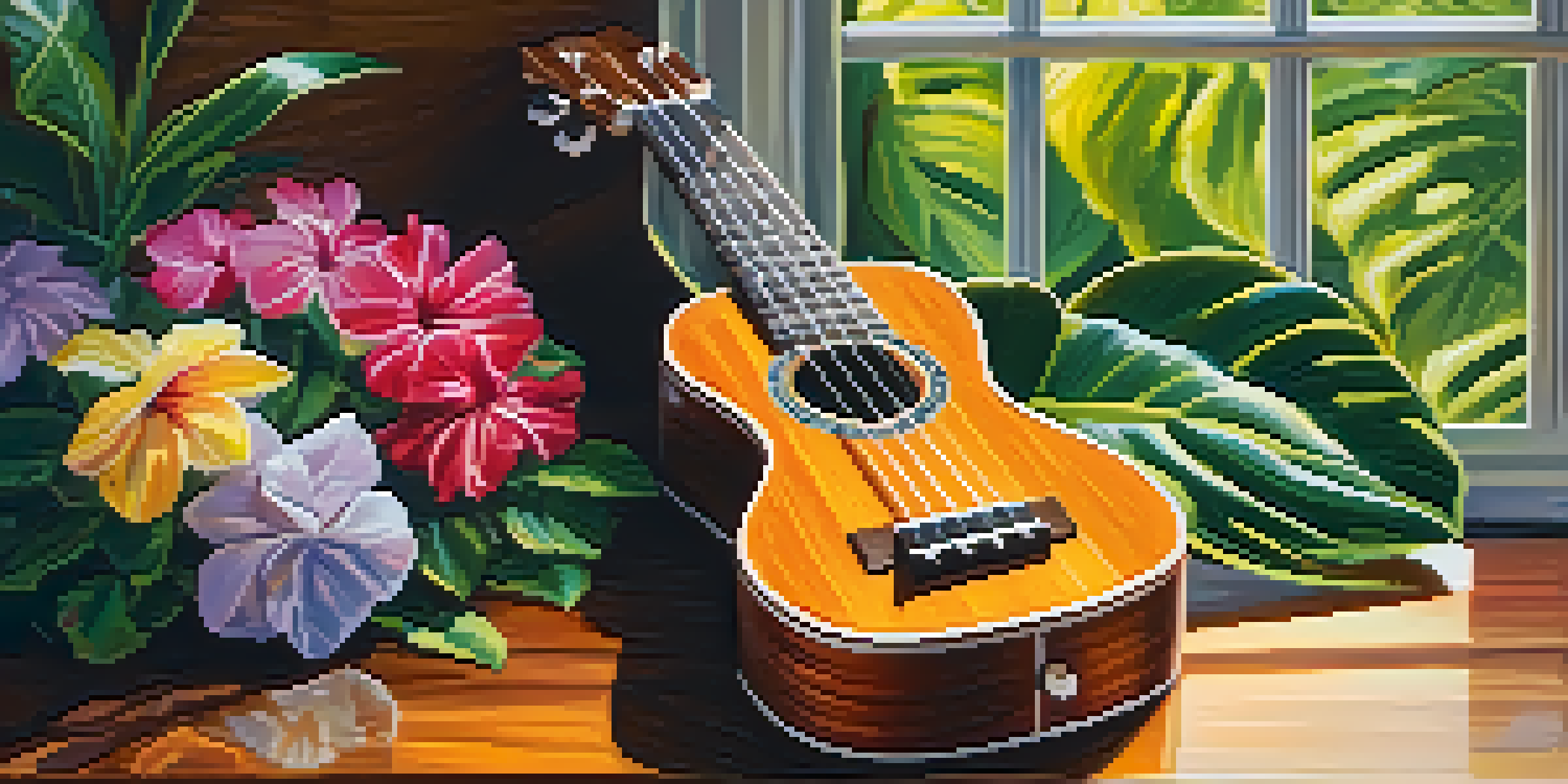Ukulele in Rock: Unconventional Sounds in Popular Music

The Ukulele: A Brief Introduction to Its Roots
The ukulele, often associated with Hawaiian music, has a rich history that dates back to the late 19th century. Originally derived from the Portuguese braguinha, this small, four-string instrument quickly became a favorite in many musical genres. Its cheerful sound and compact size make it accessible for players of all skill levels, which has contributed to its rising popularity in contemporary music.
The ukulele is a small instrument with a big sound, and it carries a lot of joy wherever it goes.
While the ukulele is traditionally linked to folk and pop music, its versatility allows it to cross into various genres, including rock. Musicians are increasingly exploring its unique tonal qualities, which can provide a fresh alternative to the more commonly used guitar. This shift opens the door for innovative soundscapes and creative experimentation within popular music.
Related Resource
As artists seek to define their unique sound, the ukulele's lightheartedness offers a stark contrast to the often heavier tones of rock music. This juxtaposition helps create a distinctive auditory experience that captures listeners' attention. The instrument's playful nature encourages musicians to push boundaries and explore unconventional sounds.
Notable Rock Songs Featuring the Ukulele
Several rock songs have successfully integrated the ukulele, showcasing its potential to enhance popular music. For example, 'Hey, Soul Sister' by Train features the ukulele prominently, contributing to the song's upbeat and catchy vibe. Its inclusion helped the track become a massive hit, demonstrating how the instrument can elevate rock music to new heights.

Another example is 'Riptide' by Vance Joy, which uses the ukulele to create a whimsical and inviting atmosphere. This track's blend of indie rock and folk elements, combined with the ukulele, offers a refreshing sound that resonates with a wide audience. The song's success further illustrates how the ukulele can seamlessly fit into the rock genre.
Ukulele's Versatility in Rock Music
The ukulele's unique tonal qualities allow it to blend seamlessly into various musical genres, including rock, adding a fresh perspective to traditional sounds.
These songs exemplify how the ukulele can add depth and character to rock music without overshadowing traditional elements. By incorporating this unconventional instrument, artists can craft a sound that stands out in a crowded musical landscape. The growing presence of the ukulele in rock music signals a shift towards more diverse and innovative compositions.
The Ukulele's Influence on Modern Rock Artists
Modern rock artists are increasingly embracing the ukulele, recognizing its ability to add a unique twist to their sound. Bands like Paramore have experimented with the instrument, incorporating it into their music to create a fresh take on their established style. This willingness to explore new sounds speaks volumes about the evolving nature of rock music.
The ukulele is not just for Hawaiian music; it’s for everyone, everywhere.
The ukulele's influence can also be seen in the work of solo artists like Eddie Vedder, who uses it extensively in his solo projects. In his album 'Ukulele Songs,' Vedder showcases the instrument's capabilities, bridging the gap between rock and folk. His commitment to using the ukulele highlights its versatility and potential to resonate with a broad audience.
Related Resource
As more artists adopt the ukulele, it encourages a new generation of musicians to experiment with unconventional sounds. The instrument’s playful essence allows for creative exploration, which can lead to innovative music that challenges traditional rock norms. This trend reflects a larger movement within the industry towards inclusivity and diversity in musical expression.
The Role of the Ukulele in Live Performances
The ukulele's compact size and portability make it a fantastic choice for live performances, especially in intimate settings. Musicians can easily incorporate it into their setlists, allowing for a change of pace during concerts. The instrument’s lighthearted sound can engage audiences and create a fun, upbeat atmosphere that encourages participation.
Many artists utilize the ukulele as a way to connect with their audience on a personal level. By playing this approachable instrument, performers can create an inviting environment that fosters a sense of community. This connection often leads to memorable experiences for both the artist and the audience, further solidifying the ukulele's role in modern rock music.
Cultural Impact and Accessibility
The ukulele's rise in popularity reflects a cultural shift towards authenticity in music, making it an accessible entry point for aspiring musicians and fostering community engagement.
Moreover, the visual appeal of the ukulele adds to its charm during live shows. Its colorful designs and playful demeanor can captivate audiences, making performances more engaging. This combination of sound and visual elements creates a unique concert experience that keeps fans coming back for more.
Cultural Impact: The Ukulele in Popular Music
The ukulele's rise in popularity reflects a broader cultural shift in music consumption. As listeners seek authenticity and connection in their music, the ukulele serves as a symbol of simplicity and joy. Its cheerful sound resonates with audiences, making it a sought-after instrument for artists looking to convey positive messages.
In recent years, the ukulele has gained traction in popular music, appearing in various genres beyond rock. This crossover appeal has led to collaborations between artists from different backgrounds, enriching the musical landscape. As the ukulele continues to make its mark, it encourages creativity and innovation across genres.
Related Resource
This cultural impact also extends to music education, where the ukulele is often introduced as an entry-level instrument. Its accessibility empowers aspiring musicians to start their musical journey without feeling overwhelmed. This grassroots movement contributes to a growing appreciation for the ukulele, further solidifying its place in popular music.
Learning the Ukulele: An Accessible Entry Point
One of the most appealing aspects of the ukulele is its accessibility for beginners. With just four strings and simple chord structures, aspiring musicians can quickly learn to play recognizable songs. This ease of learning encourages more people to pick up the instrument and explore their musical interests.
The ukulele's friendly nature makes it an excellent choice for group lessons and community engagement. Many schools and community centers are incorporating ukulele programs to foster a love for music among young people. This approach not only builds confidence but also nurtures creativity and collaboration.
Future Innovations with the Ukulele
As artists continue to experiment with the ukulele, its role in rock music is set to grow, potentially leading to innovative compositions that challenge traditional norms.
As more people embrace the ukulele as their first instrument, its influence on popular music will likely continue to grow. This trend can lead to a new generation of musicians who are unafraid to experiment with unconventional sounds. Ultimately, the ukulele serves as a gateway to musical exploration, inviting everyone to join the rhythm.
The Future of the Ukulele in Rock Music
As the music industry evolves, the ukulele's role in rock music is poised for exciting developments. With artists continually seeking new sounds, the ukulele offers a fresh perspective that can breathe new life into the genre. Its unique tonal qualities and playful nature encourage musicians to push boundaries and explore innovative compositions.
The growing popularity of the ukulele suggests that it will continue to carve out a niche within rock music. Collaborations between rock artists and ukulele players may lead to groundbreaking tracks that redefine the genre. As listeners become more open to diverse sounds, the ukulele's presence in rock will likely expand further.

Ultimately, the future of the ukulele in rock music is bright, filled with creative possibilities. As musicians embrace this unconventional instrument, they pave the way for new musical landscapes that challenge traditional norms. The ukulele’s integration into rock will undoubtedly continue to captivate audiences and inspire future generations of artists.